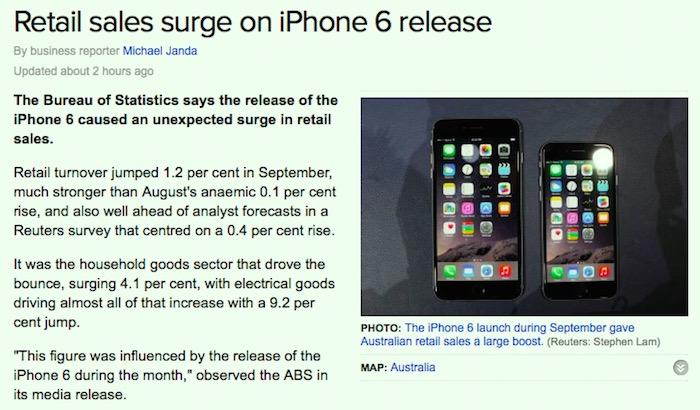Following an anemic 0.1 percent rise in August, Australia's Bureau of Statistics reported that retail turnover lept to 1.2 percent growth in September, crediting Apple's iPhone 6 launch for driving the unexpected growth.
"This figure was influenced by the release of the iPhone 6 during the month," ABS reported, as noted in an ABC.net.au article tweeted by @BDASPresident.
"The increase in electrical and electronic goods retailing represents about half of the total Australian sales movement of 1.2 percent in seasonally adjusted terms," of which nearly half (0.5 percentage points) were attributed to electronics.
A Reuters survey of analyst forecasts had predicted a 0.4 percent total increase, indicating more positive results than expected for both iPhone sales and the broader economy.
iPhone also driving the U.S. economy
Last week, the New York Times cited Michael Feroli, chief United States economist for JPMorgan Chase, as estimating that "iPhone sales are adding one-quarter to one-third of a percentage point to the annualized growth rate of the gross domestic product."
The report added that in September, "electronic and consumer appliance store sales jumped 3.4 percent while clothing sales fell 1.2 percent," leading Feroli to conclude, "people are buying iPhones, partly as a status symbol. They're not buying as much clothing."
Apple's rising stock is also having an impact on the U.S economy. Paul Hickey, co-founder of the Bespoke Investment Group was cited as calculating that "Apple accounted for 18 percent of the entire rise of the S.&P. 500 index this year."
 Daniel Eran Dilger
Daniel Eran Dilger








 Christine McKee
Christine McKee
 Malcolm Owen
Malcolm Owen

 Charles Martin
Charles Martin


 Mike Wuerthele
Mike Wuerthele


-m.jpg)






40 Comments
I think that it's fairly safe to assume that you have a smoking hot product if a phone can significantly boost an entire country's retail sales.
[@]Benjamin Frost[/@] doesn't think these 4.7" and 5.5" devices are selling because Apple has yet to release their results for 1Q2015. :roll eyes: What are you hiding, Apple¡
Did the author seriously write "lept"? Do the writers at AI even use Apple products?
To me, it shows the economic error of policies that try to "boost demand." You don't need to boost demand, you need to boost supply, of cool stuff, then people will buy it. In the absence of cool stuff you can adjust all the economic levers you like and people will just keep their money in the bank.
I think that it's fairly safe to assume that you have a smoking hot product if a phone can significantly boost an entire country's retail sales.
Or, you have a teeny tiny country, certainly one of the two anyway.